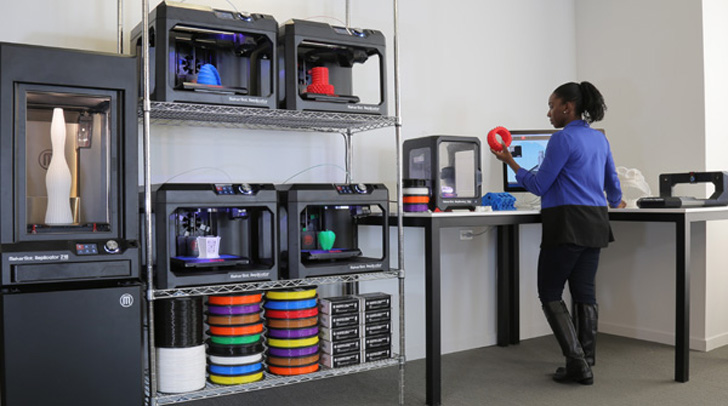If your 3D printer is broken down and you just can’t seem to fix it, you might look for your local 3D print shop or makerspace and see if any one of those 3D printing experts might be able to help you out. Now, MakerBot Europe has made that customer service model official, introducing eight MakerBot Authorized ServiceCenters in the Old World that will handle all customer issues within new 12-month MakerBot Europe Guarantee and the new European MakerCare Protection Plan.
Upon in-depth certification training at MakerBot Europe headquarters in Stuttgart, Germany, a group of eight MakerBot Resellers were chosen by MakerBot Product Specialists to represent the first in a series of MakerBot Authorized ServiceCenters. Having proven themselves as capable resellers, as well as having the technical skills and personpower, these businesses will now be able to act as a local access point for servicing MakerBot customers: Schimautz Ges.m.b.H., in Austria; KD85, in Belgium; Machines-3D in France; CadXpert, in Poland; 3WAY d.o.o., in Slovenia; Ultralab S.L., in Spain; Alltron AG, in Switzerland; and 3bFab, in Turkey.
Valentin Storz, Vice President Operations with MakerBot Europe, says of the new program, “It is great to know that we have the MakerBot Authorized ServiceCenters set up now. We believe that the close collaboration between MakerBot Europe and the ServiceCenters will enable our customer to enjoy the best customer experience. I’m happy that we are now starting to set up a system that grants quick and easy support to customers all over Europe.”
In addition to the launch of a new MakerBot Innovation Center in Northern Italy, this program helps to expand the consumer brand’s presence in the continent. After surprise layoffs earlier this month, this strategy of leveraging the European market may help them offset potential issues in the US. At the same time, by certifying third party retailers as ServiceCenters, this allows the Stratasys brand to save money on customer service representatives in the face of lowered profits, as reflected in preliminary first-quarter 2015 results.
After yesterday’s closing bell, Stratasys announced their preliminary financials for the first quarter, causing the company’s stock to drop 16% during after-hours trading. The company stated that it expected revenue of between $171 million to $173 million for Q1, falling short of analysts’ anticipated $198.8 million. In addition to lowered spending in unspecified industries, increased mergers and acquisitions, and less-than-expected purchases of their new Connex systems and sales in the Asia-Pacific region, the company announced that it would be taking another goodwill impairment charge of between $150 million and $200 million for MakerBot losses.
This is the second such impairment charge the company has taken as a result of their $403 million MakerBot purchase in 2013. The first $102 million impairment charge caused Stratasys stock to plummet at the beginning of the year and even lead to a stockholder lawsuit. For a clarification on what this charge is, I give you wikinvest, “An Impairment Charge is incurred when the fair value of a company’s goodwill is less than the recorded value. If the fair value of goodwill is less than the recorded value, a company’s goodwill is said to be “impaired” and the difference (between the fair value and recorded value) must be charged off as an expense.”
In other words, MakerBot has proven not to be worth as much as the company paid for it, leading to a total of about $277 million in impairment charges. All of the above factors led the company to lower its 2015 guidance from $940 million-$960 million to $800 million-$860 million. As a result of the MakerBot brand, we’ve seen the company layoff workers, sell its consumer products off in large Innovation Center and Starter Lab packages and through a massively ramped up distribution campaign, launch a leasing program, as well as reach out to 3rd party vendors for customer service support.
Though the brand may be having trouble, Stratasys, along with Objet, has long proven itself a leader in the 3D printing industry with technology that remains important and innovative. In other words, the company still has a chance to revitalize its consumer line, as larger corporations like HP enter the market. To do so, Stratasys may need to start thinking outside of the box, even implementing open source strategies like Autodesk, to drive growth and regain consumer trust. Additionally, it wouldn’t hurt for the company to follow in the footsteps of my grandfather. When Papar’s employer, *shutters* Raytheon, had considered laying off employees, he suggested that all of the company’s executives take a pay cut instead.


Leave A Comment